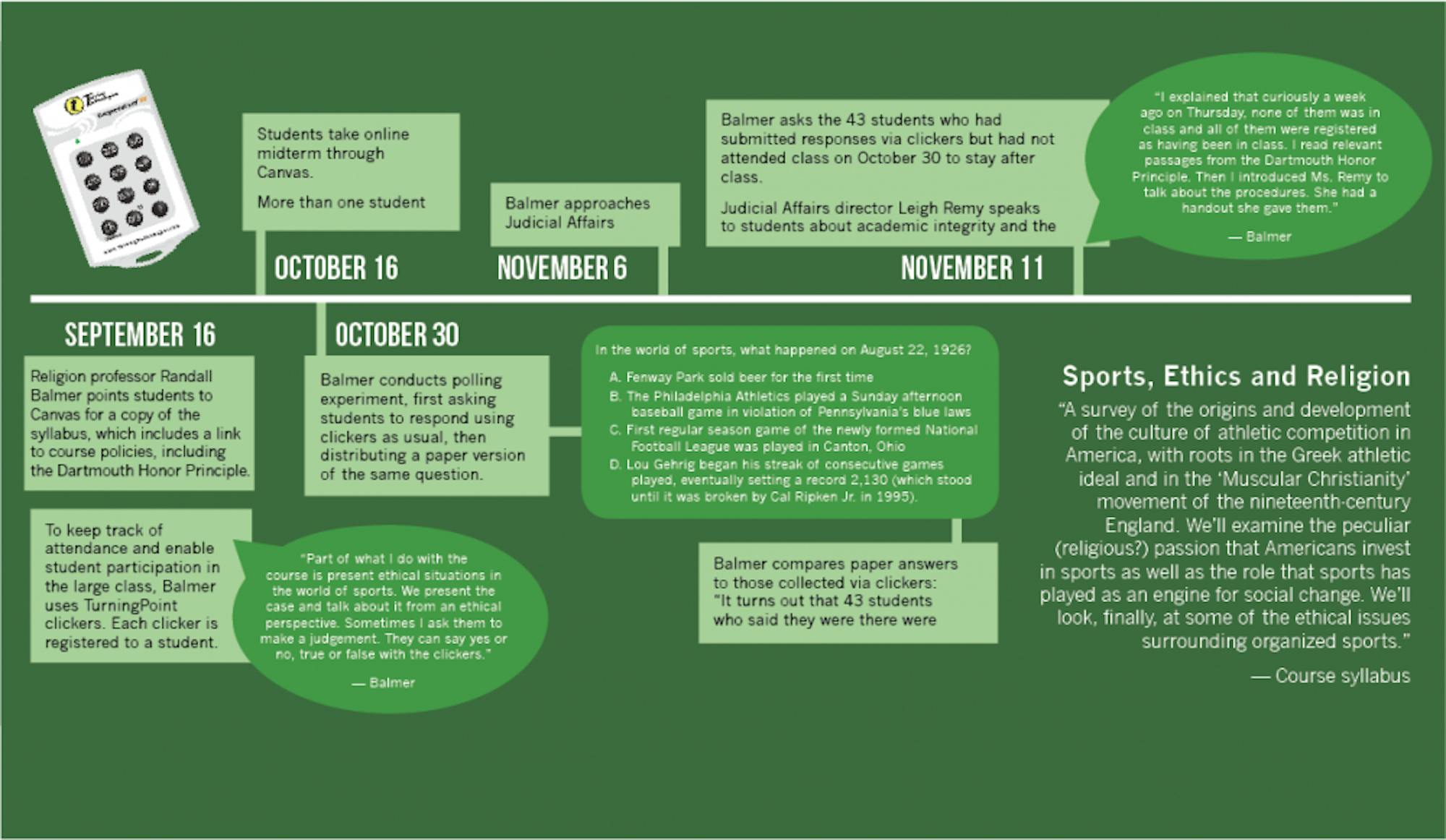Forty-three students may be implicated in an academic dishonesty case after religion professor Randall Balmer found a discrepancy between the number of students digitally submitting answers to in-class questions and the number of students present in class on Oct. 30. Balmer held the accused students, enrolled in “Sports, Ethics and Religion,” after class on Tuesday so that judicial affairs director Leigh Remy could inform them of their rights and possible disciplinary action.
Balmer said he was also aware of cheating incidences during the class’s midterm exam, which was administered online. He said multiple students told him cheating occurred during the test, even after he told students that they were not allowed to click out of the exam to Google questions.
Balmer said he has not decided if he will remove the 43 students from the class.
Remy was not available for comment by press time and did not respond to emailed questions sent Tuesday evening.
Unauthorized collaboration and giving and receiving assistance during an examination or quiz violate the academic honor principle. The Committee on Standards saw 36 students for academic honor principle violations last academic year. Thirty-nine percent of violations involved cheating, and 17 percent involved unauthorized collaboration.
Two-thirds of students who were disciplined for honor principle violations received suspensions, most spanning two and four terms. Other sanctions included reprimands and separation.
Balmer used clicker devices to assess participation in the 272-person class. Each clicker is registered with one student, who gains points for submitting answers to certain in-class questions. A program integrates these answers into the class’s online grade book, which allows professors to track responses in real time.
The class, held in Cook Auditorium at the Tuck School of Business, enrolls 174 more students this term than it did last fall, according to Balmer and the ORC timetable. The class is the largest offered by Dartmouth this term, and the next-largest religion class offered this term enrolls 54 students.
The course is designed specifically with athletes in mind, Balmer said. About 68 percent of students enrolled in the course are varsity athletes, according to an analysis of the class roster conducted by The Dartmouth. About one quarter of Dartmouth students compete for the school.
“I wanted to appeal to their interest, have a positive experience, allow them to succeed and build on that for their remainder of Dartmouth,” he said in an interview on Tuesday afternoon, sitting in his Thornton Hall office. “Obviously it’s a great disappointment to me that many of the students, including many athletes, subverted the whole experience.”
Several weeks ago, Balmer said, he began to suspect that students were skipping class and sending their clickers to class with friends to gain points for attendance. On Oct. 30, Balmer measured how many students were in class. After asking the class a question to answer on their clickers, he passed out a paper version of the same question — “In the world of sports, what happened on August 22, 1926” — to each student in the classroom.
“The TAs and I distributed these sheets to all the students in the class, being very careful not to distribute more than there were students in the class,” Balmer said. “It turns out that 43 students who said they were there were not there.“
Balmer reported the incident to Remy and learned that the honor code required him to report such violations for referral to the COS, he said. He said he initially sought permission to offer a plea bargain for involved students.
“I want to emphasize that this whole thing is very sad to me,” Balmer said. “I derive no satisfaction whatsoever.”
Attendance and participation account for about 15 percent of a student’s grade in the class, according to the syllabus. Other projects include a midterm and a final examination, a book review and a debate.
Based on what Remy told students Tuesday, Balmer said, he believes the COS will make disciplinary decisions based on precedent and prior infractions.
Balmer, who said he has never experienced large-scale cheating in his classes, said he does not believe that the class’s large size is the reason for the incident, though he recognized that others may make that charge.
“Any student who wants to cheat will find a way to do that,” he said.
As every person who gave a clicker to a peer must have collaborated with an unknown number of students, Balmer said, there is no way for him to determine who exactly violated the honor principle.
Balmer said he will continue to use clickers in class, but he added that he is so discouraged that he may not teach the class again.
“I’ve spent more time in this course, lost more sleep on this course, than any other course in my 30 years of teaching,” he said. “And to have things turn out this way — it’s heartbreaking to me.”
A student in the class, who wished to remain anonymous because he did not want his grade in the class affected, said that the implicated students included only those who gave their clickers to friends on Oct. 30, but cheating in the class was a term-long occurrence.
Another student in the class, who requested anonymity because he did not want his name associated with cheating, said that attendance worsened as the term progressed.
Physics and astronomy professor John Thorstensen, who uses clickers in his classes, said that he has never experienced an incident so “egregious.” While Thorstensen said he learns the names and faces of those in his classes, which he said tend to enroll about 50 students or fewer, tracking attendance in a larger class presents a greater challenge.
In 2000, 78 students were investigated for cheating in a computer science course, but charges against all students were dropped. After an investigation, the school could not determine who had cheated on a homework assignment.
Taylor Malmsheimer contributed reporting.




